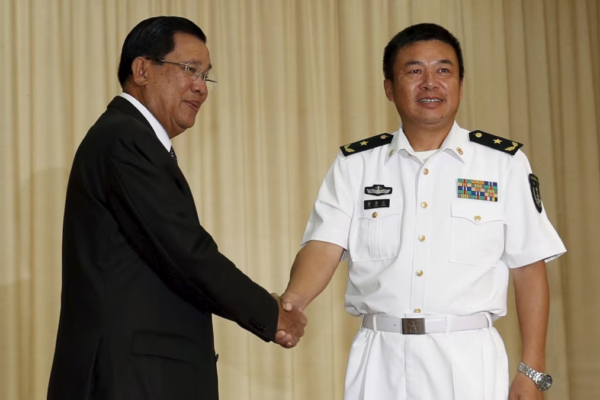Cambodia’s Ream naval base to open in early April
The Chinese-developed Ream naval base in southwest Cambodia’s Sihanoukville province is slated to open early next month after three years of construction, a Cambodian commander has said. General Vong Pisen, commander-in-chief of the Royal Cambodian Armed Forces, or RCAF, told the new Japanese military attaché in the kingdom that after the launch in early April, Cambodia would allow warships from his country to be the first to “historically” dock at Ream. Up until now, the main, new part of the base where China has built a deep draft pier capable of handling ships as large as aircraft carriers, a dry dock and other facilities, has been off limits to foreign vessels apart from Chinese ones. When a U.S. Navy ship visited Cambodia for the first time in eight years in December last year, it docked at Sihanoukville Autonomous Port some 20 kilometers (12 miles) away. Radio Free Asia reported last month that China sent two more warships to Ream, indicating that the construction may be near completion and the planned transfer of Chinese ships to Cambodia was imminent. This week, the naval base’s management announced that the inauguration ceremony for a Cambodia-China Logistics and Training Center would be held soon. RELATED STORIES Chinese defense company builds industrial estate in Cambodia Canadian warship visits Cambodia after drills in South China Sea Cambodia asks to renew joint drills with US amid Ream base concerns China’s foothold China and Cambodia began developing the Ream naval base with Beijing’s funding in June 2021 but a ground breaking-ceremony was held one year later in 2022. Last August, when visiting Ream, a RFA reporter witnessed the fast pace of development and was told that 100 Chinese naval personnel were “working day and night” on it. Together with the new facilities, Beijing is to give Cambodia two vessels, likely Type 056A missile corvettes, and has been training the Cambodian navy how to use them. Cambodia’s defense minister Tea Seiha (second left) inspects the Ream naval base on March 15, 2025. To his right is his cousin Tea Sokha, the new navy commander.(Facebook/Ream naval base) During the meeting on Tuesday between Gen. Vong Pisen and Japan’s military attaché, Takashi Hara, Vong said that the fact that Japanese vessels were to be given the first access showed “the high level of cooperation, communication and mutual trust” in the Cambodia-Japan comprehensive strategic partnership. Political commentator Kim Sok told RFA Khmer service that the gesture was designed to ease tensions surrounding the Chinese military presence at Ream because Japan is an ally of the United States and at the same time not considered a rival to China, therefore neutral. The U.S. has repeatedly expressed concerns over the lack of transparency in the Ream base’s development while Cambodia’s neighbors worry that a foothold at Ream would give China better control over the Indo-China peninsula and the South China Sea. Cambodia’s constitution does not allow foreign bases in the country but analysts say that China, having invested a large sum of money in the project, would have preferential access to Ream. Collin Koh, senior fellow at the S. Rajaratnam School of International Studies in Singapore, said that the arrangement was to give Beijing access to Ream’s facilities “predicated upon an on-demand basis, meaning they would have to be made available upon China’s request.” Edited by Mike Firn We are : Investigative Journalism Reportika Investigative Reports Daily Reports Interviews Surveys Reportika



